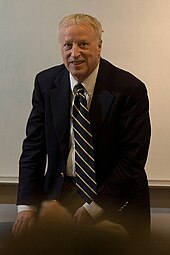George A. Akerlof
George Arthur Akerlof (born June 17, 1940 in New Haven , Connecticut ) is an American economist and winner of the 2001 Nobel Prize in Economics . Akerlof is Professor of Economics at Georgetown University .
Life
Akerlof studied at Yale and received his PhD from the Massachusetts Institute of Technology . He spent most of his career, from 1966 to 2014, at the University of California, Berkeley , with interruptions from 1967 to 1968 as a professor in India and from 1978 to 1980 at the London School of Economics . In 2014 he moved to Georgetown University .
He is married to economist Janet Yellen , who served on the staff of economic advisors for a period during the Bill Clinton presidency and was chief executive of the Federal Reserve Board from 2014 to 2018 .
In 2006, Akerlof served as president-elect of the American Economic Association .
Act
In his most famous essay, The Market for Lemons , he examined the mechanisms of the used car market and showed that free markets do not work when buyers and sellers have unequal access to information. Since incompletely informed prospective buyers cannot distinguish between inferior and higher quality offers, they are not prepared to pay reasonable prices for the better cars. Their owners are therefore reluctant to offer them. In this way (in analogy to Gresham's law ) the "Monday cars " (English lemons ) replace the "good" cars.
In the essay Economics and Identity published in 2000 and later work, Akerlof and American economist Rachel Kranton introduced social identity into formal economic analysis. Including social psychology and many other areas outside of economics, Akerlof and Kranton argue that preferences are not only formed on the basis of common decision variables such as income and price. They are also based on social norms of how people should behave. The norms that someone follows are also determined by their social identity.
In 2001, together with Joseph E. Stiglitz and Michael Spence, he received the Alfred Nobel Memorial Prize for Economics for their work on the relationship between information and markets, particularly adverse selection . He was also elected to the American Academy of Arts and Sciences in 1985 and the National Academy of Sciences in 2003 .
Political commitment
Akerlof is one of the sharpest critics of the policies of US President George W. Bush . In 2003 he and other Nobel Prize winners signed two public protest notes against American government policy. One was directed against planned tax cuts, the other against a unilateral preventive war in Iraq. In an interview with Der Spiegel in July 2003, he said: I think this government is the worst in the more than 200-year history of the United States. It acted extremely irresponsibly not only in foreign and economic policy, but also in social and environmental policy. This is no longer normal politics. The time has come for the people to practice civil disobedience.
In January 2007, in an address to the American Economic Association , he pleaded for a rehabilitation of Keynesianism and criticized neoclassics because it neglects social norms in their utility functions .
He is co-founder of the Institute for New Economic Thinking (INET) , which was founded at the end of October 2009 .
Fonts
Monographs
- with Rachel E. Kranton: Identity Economics: How Our Identities Shape Our Work, Wages, and Well-Being , Princeton University Press, Princeton, New Jersey, 2010, ISBN 978-0-691-14648-5 .
- German: Identity Economics: Why we tick completely differently than most economists think . Carl Hanser Verlag, Munich 2011. ISBN 978-3-446-42696-2 .
- with Robert J. Shiller : Animal Spirits . How human psychology drives the economy, and why it matters for global capitalism . Princeton University Press, Princeton, New Jersey, 2009, ISBN 978-0-691-14233-3 .
- Explorations in pragmatic economics. Oxford 2005, ISBN 0-19-925391-9 .
- An economic theorist's book of tales. Cambridge 1984, ISBN 0-521-26323-9 .
Editorships
- Efficiency wage models of the labor market. Cambridge 1990, ISBN 0-521-32156-5 .
Essays
- The Market for 'Lemons': Quality Uncertainty and the Market Mechanism. In: The Quarterly Journal of Economics. Volume 84, No. 3, August 1970, pp. 488-500.
Individual evidence
- ↑ George A. Akerlof. (No longer available online.) Archived from the original on September 10, 2015 ; Retrieved January 31, 2017 (curriculum vitae published on Georgetown University). Info: The archive link was inserted automatically and has not yet been checked. Please check the original and archive link according to the instructions and then remove this notice.
- ^ Past and Present Officers. aeaweb.org ( American Economic Association ), accessed October 21, 2015 .
- ↑ George A. Akerlof, Rachel E. Kranton: Economics and Identity . In: Quarterly Journal of Economics . tape 115 , no. 3 , 2000, pp. 715-753 , doi : 10.1162 / 003355300554881 ( PDF ).
- ↑ George A. Akerlof: The Missing Motivation in Macroeconomics . In: American Economic Review . tape 97 , no. 1 , March 2007, p. 5–36 , doi : 10.1257 / aer.97.1.5 ( PDF ).
- ↑ million attack on established economics ; Handelsblatt, November 3, 2009
Web links
- Literature by and about George A. Akerlof in the catalog of the German National Library
- Information from the Nobel Foundation on the 2001 award ceremony for George Akerlof (English)
- Homepage of George Akerlof
- Spiegel interview July 2003
- Handelsblatt article Where Keynes Was Right and Friedman Was Wrong , January 2007
| personal data | |
|---|---|
| SURNAME | Akerlof, George A. |
| ALTERNATIVE NAMES | Akerlof, George Arthur |
| BRIEF DESCRIPTION | American economist |
| DATE OF BIRTH | June 17, 1940 |
| PLACE OF BIRTH | New Haven |
